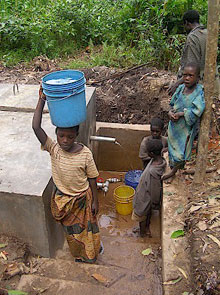Rotary water symposium in Israel stresses sustainability
By Abby Breitstein
Rotary International News – 5 December 2011
More than 100 Rotarians took part in an international water symposium in Tel Aviv on 16 November, discussing ways that Rotary can help meet the world's water and sanitation needs.
The symposium, sponsored by District 2490, was held in conjunction with WATEC Israel 2011, an annual water technology exhibition and conference that draws thousands of researchers, developers, politicians, and business executives from around the world.
RI President Kalyan Banerjee, addressing both symposium attendees and the larger WATEC audience, emphasized the need for Rotary service projects to be sustainable.
Sustainability "means that there will not be a problem finding parts, fixing something that is broken, finding the money for maintenance, keeping the project going," he said. "It means the community will take ownership of a solution, so that even though it might have come from Rotary originally, it no longer belongs to Rotary."
Community input
Banerjee used the example of solar ovens to illustrate why successful service projects need to begin with community input. Though solar ovens might look like a perfect solution to the problem of finding cooking fuel -- their energy source is free, inexhaustible, and nonpolluting; they are cheap to make; and they preclude the need to gather wood and cut down trees -- other factors might have to be considered, he said. Perhaps local foods need to be cooked at hotter temperatures than a solar oven provides, or the area is very windy and the ovens could blow away, or the local women traditionally rise before dawn to cook.
"These are all issues that you simply might not have thought of," Banerjee said. "When we are talking about solutions to a problem, we must recognize that solutions cannot be imposed. They have to be developed, they have to be appropriate, they have to be a product of communication and cooperation."
Ron Denham, chair of the Water and Sanitation Rotarian Action Group and a member of the Rotary Club of Toronto Eglinton, Ontario, Canada, said it is especially important to choose appropriate technology for water projects in low-income areas.
"Appropriate technology means that the technology is within the capability and capacity of the people to use. It has to be very simple," he said. "The community also has to be able to afford to operate and maintain the facility."
The day's events brought together a wealth of expertise in water technology in a country that is the world's leader in water conservation.
Conference organizer Avner Fuchs, past governor of District 2490 and a member of the Rotary Club of Gedera, explained that Israel exists in a "permanent state of water shortage. We cannot waste any water, so we look at ways not only to use less water, but to reuse water in every way we can."
Fuchs said Israel recycles 75 percent of its uncontaminated wastewater, adding that the figure will rise to 95 percent by 2020. "Reclaimed water goes into things like cotton, trees, flowers -- anything that people don’t end up eating or drinking," he said.
For more information:
- Find out how you and your Rotary club can get involved in a sustainable water project through the Water and Sanitation Rotarian Action Group.
- Learn about Rotary's areas of focus, including water and sanitation.

No comments:
Post a Comment